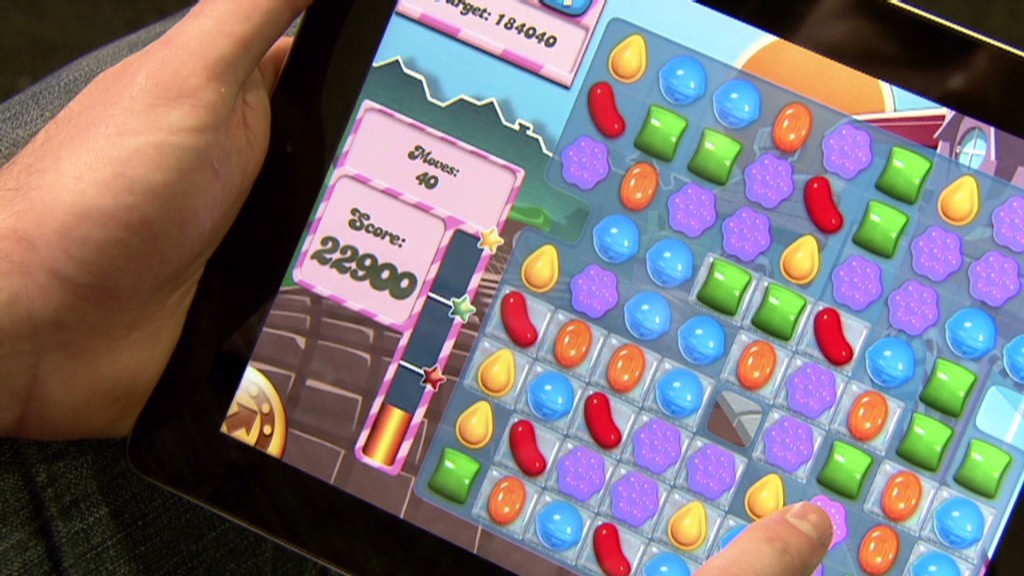
The PlayStation 4 and Xbox One may be the last of a dying breed of disc-based video game consoles.
The booming mobile and free-to-play video game markets are seriously weighing down today's disc-based game sales. Sales of new and used video game discs made up just 35% of overall video game sales last year, according to research firm Newzoo. That's down from 40% in 2012.
Meanwhile, smartphone and tablet games are taking control of the video game industry. For example, King's popular Candy Crush Saga game earns over $1 million per day from in-game sales of extra lives and power boosters. Mobile consumers play King's games more than 1 billion times a day --up three-fold from a year ago. The company announced its plans to go public on Tuesday.
That's why video game consoles are rethinking their disc-only strategies. Sony (SNE) included free-to-play games for the PS4 at launch. The popular free online game "World of Tanks" is now available on the Microsoft (MSFT) Xbox 360.
As consumers get more accustomed to playing high-quality mobile games for free, and smart TVs become commonplace, there is no question that free-to-play games will eventually become popular games for the big screen as well, according to Peter Warman, president of Newzoo.
"Free-to-play games can gross the same numbers in revenues as paid games, so publishers no longer have an excuse," said Warman.

Not only can video game publishers make money on free games, they can save resources as well. That's because launching a completely finished game that is burnt on a disc is an outdated software development model.
Disc-based video game companies don't get to experiment and tweak their games the way that free-to-play game companies do. Established video game companies have to come out with sequels instead of updating the games consumers are already using. And since publishers hardly get any revenue from sales of used games, video game makers jack up prices of new discs at least threefold, according to Warman.
The reason big video game makers like Activision (ATVI) and Take-Two Interactive (TTWO) haven't yet embraced free-to-play games in the United States is because their disc-based games are still driving big sales. Activision's "Call of Duty: Ghosts" and Take-Two's "Grand Theft Auto V" each passed $1 billion revenue in record time in the fall.
Related: 'Call of Duty Ghosts' is Activision's next billion dollar video game
But the handwriting is on the wall for disc-based games.
"High-end categories with big budgets like first-person shooters, advanced sports games, adventure and role-playing games are doing better than ever," said David Cole, president of DFC Intelligence. "But in today's market it is really difficult to get consumers to pay for anything that is not top of the line."
Perhaps no video game company has struggled more from consumers' shift to free-to-play casual games than Nintendo. The video game giant once had great success charging a premium for casual mobile and Wii games. But sales of its new Wii U console have been abysmal.
"Disc-based games will disappear completely, or be decimated, within the next five years to a level we currently see with music," said Warman.
As a start, Warman expects video game publishers to try offering lesser titles as "digital only" for $20.
Before all games go completely digital, data storage prices will need to come down. Discs are basically a cheap form of storage. Right now a large disc game would take up the entire storage space of an iPad. Putting a game on a disc is a much more economical solution.
As cloud storage becomes a more viable option, that will start to change, but DFC's Cole believes discs are likely to be around for a while, especially for the biggest games.
As mobile games help the video game industry expand, there's a larger audience out there for savvy game makers to connect with directly through digital channels. Losing the disc one day won't be a bad thing. And unlike the music industry, game makers have embraced new technology and the new digital distribution revenue streams that have opened up.

